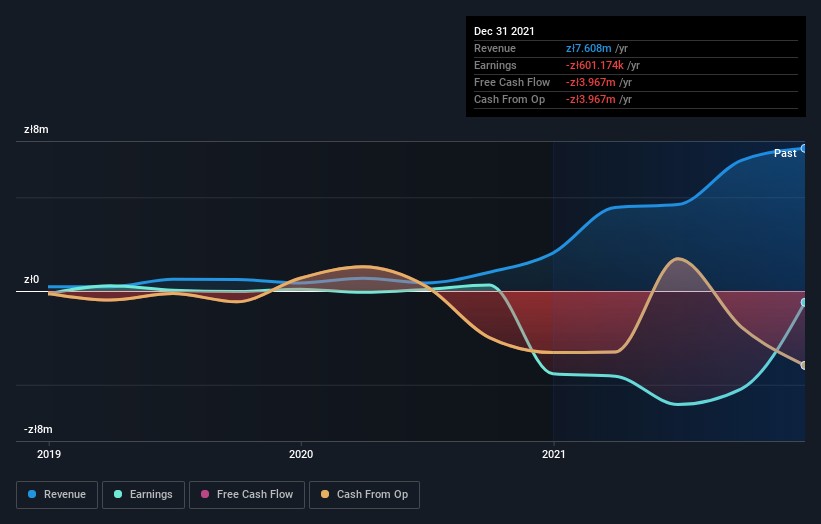- Poland
- /
- Capital Markets
- /
- WSE:CAI
Private equity firms who have a significant stake must be disappointed along with institutions after Carlson Investments S.A.'s (WSE:CAI) market cap dropped by zł48m
If you want to know who really controls Carlson Investments S.A. (WSE:CAI), then you'll have to look at the makeup of its share registry. The group holding the most number of shares in the company, around 52% to be precise, is private equity firms. That is, the group stands to benefit the most if the stock rises (or lose the most if there is a downturn).
Following a 10% decrease in the stock price last week, private equity firms suffered the most losses, but institutions who own 24% stock also took a hit.
In the chart below, we zoom in on the different ownership groups of Carlson Investments.
View our latest analysis for Carlson Investments

What Does The Institutional Ownership Tell Us About Carlson Investments?
Many institutions measure their performance against an index that approximates the local market. So they usually pay more attention to companies that are included in major indices.
We can see that Carlson Investments does have institutional investors; and they hold a good portion of the company's stock. This suggests some credibility amongst professional investors. But we can't rely on that fact alone since institutions make bad investments sometimes, just like everyone does. If multiple institutions change their view on a stock at the same time, you could see the share price drop fast. It's therefore worth looking at Carlson Investments' earnings history below. Of course, the future is what really matters.

Carlson Investments is not owned by hedge funds. Looking at our data, we can see that the largest shareholder is Carlson Private Equity Limited with 52% of shares outstanding. With such a huge stake in the ownership, we infer that they have significant control of the future of the company. Bouchard Et Cie SA is the second largest shareholder owning 24% of common stock, and Artur Jedrzejewski holds about 12% of the company stock.
While studying institutional ownership for a company can add value to your research, it is also a good practice to research analyst recommendations to get a deeper understand of a stock's expected performance. As far as we can tell there isn't analyst coverage of the company, so it is probably flying under the radar.
Insider Ownership Of Carlson Investments
While the precise definition of an insider can be subjective, almost everyone considers board members to be insiders. Company management run the business, but the CEO will answer to the board, even if he or she is a member of it.
Insider ownership is positive when it signals leadership are thinking like the true owners of the company. However, high insider ownership can also give immense power to a small group within the company. This can be negative in some circumstances.
Our information suggests that insiders maintain a significant holding in Carlson Investments S.A.. It has a market capitalization of just zł430m, and insiders have zł51m worth of shares in their own names. It is great to see insiders so invested in the business. It might be worth checking if those insiders have been buying recently.
General Public Ownership
With a 13% ownership, the general public, mostly comprising of individual investors, have some degree of sway over Carlson Investments. While this group can't necessarily call the shots, it can certainly have a real influence on how the company is run.
Private Equity Ownership
With a stake of 52%, private equity firms could influence the Carlson Investments board. Some investors might be encouraged by this, since private equity are sometimes able to encourage strategies that help the market see the value in the company. Alternatively, those holders might be exiting the investment after taking it public.
Next Steps:
It's always worth thinking about the different groups who own shares in a company. But to understand Carlson Investments better, we need to consider many other factors. For instance, we've identified 4 warning signs for Carlson Investments (2 don't sit too well with us) that you should be aware of.
Of course this may not be the best stock to buy. So take a peek at this free free list of interesting companies.
NB: Figures in this article are calculated using data from the last twelve months, which refer to the 12-month period ending on the last date of the month the financial statement is dated. This may not be consistent with full year annual report figures.
New: AI Stock Screener & Alerts
Our new AI Stock Screener scans the market every day to uncover opportunities.
• Dividend Powerhouses (3%+ Yield)
• Undervalued Small Caps with Insider Buying
• High growth Tech and AI Companies
Or build your own from over 50 metrics.
Have feedback on this article? Concerned about the content? Get in touch with us directly. Alternatively, email editorial-team (at) simplywallst.com.
This article by Simply Wall St is general in nature. We provide commentary based on historical data and analyst forecasts only using an unbiased methodology and our articles are not intended to be financial advice. It does not constitute a recommendation to buy or sell any stock, and does not take account of your objectives, or your financial situation. We aim to bring you long-term focused analysis driven by fundamental data. Note that our analysis may not factor in the latest price-sensitive company announcements or qualitative material. Simply Wall St has no position in any stocks mentioned.
About WSE:CAI
Mediocre balance sheet with low risk.
Market Insights
Community Narratives





